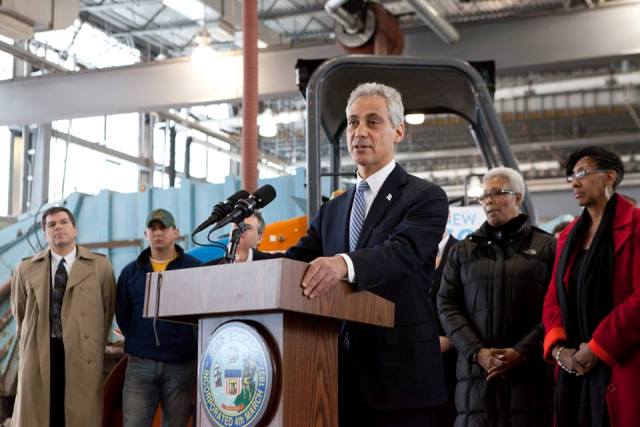Tax Hikes, Higher Employee Contributions Highlight Emanuel's Pension Reform Proposal
By Chuck Sudo in News on Apr 1, 2014 4:30PM

Photo credit: © 2014, Brooke Collins/City of Chicago
Last week it was reported Mayor Rahm Emanuel reached labor deals with building trade unions and retirees that would resolve half of the city’s looming pension debt crisis and put pressure on the police and firefighters unions to follow suit. The Sun-Times has details on that deal and homeowners and retirees should take note, as they’ll be footing a substantial portion of the tab.
The deal calls for the city to fund the deal with a $250 million increase in property taxes over five years, beginning in 2016. That means the owner of a home worth $250,000 would pay an extra $50 in property taxes in two years and an extra $250 a year after five years. City workers, meanwhile, would be expected to pay more toward their retirement plans. Their contributions would increase by 0.5 percent annually over five years. Currently, city employees pay 8.5 percent of their salary toward pensions. Emanuel’s proposal would increase those contributions to 11 percent; a city employee with a $60,000 annual salary would expect to contribute an extra $1,500 a year toward his or her pension by 2019. Without pension reform the city’s municipal employees retirement fund would become insolvent in the next 10 years while the laborers fund would run out of money in 16 years.
Needless to say, many labor unions are opposed to the Emanuel plan and aldermen are already trying to distance themselves from the plan should it be approved by the Illinois Legislature. But Emanuel has some supporters like Ald. Carrie Austin (34th).
“That’s a bitter pill. I can’t say that it isn’t—even as a homeowner myself. But if we don’t do something responsible, I don’t want to say we’ll be like Detroit. But we’ll be in terrible shape. [And] it would not be fair to our employees,” Austin said.“Sometimes, responsibility hurts. This is what we should do to be a responsible council—not duck from our responsibility because it’s more than heavy lifting. It’s back-breaking.”
Civic Federation president Laurence Msall, whose organization’s own proposal for pension reform called for taxing retirement funds ranging from pension payments to Social Security checks, said the Emanuel proposal “seems to strike a reasonable balance between the interests of employees who will pay more, retirees who will receive less benefit but greater security that their benefit will be there in the long term and taxpayers who will have a city that stabilizes its finances.”
The We Are One Chicago Coalition, a collective of many of the city’s labor unions, vehemently opposes Emanuel’s deal, claiming it violates the state’s Constitution and doesn’t propose a revenue stream “or provide any assurance that sufficient revenue will be available to make full pension payments.”
“The absence of this critical component could lead the city to continue its habitual, damaging trend of underfunding Chicago’s retirement systems,” the group added. “Poor fiscal practices led to today’s problem in the first place, even as city workers faithfully paid toward their pensions.”
Emanuel’s proposal, if approved, would put pressure on the strong police and firefighters unions to make similar concessions when it comes time to sitting down at the bargaining table. The firefighters union, in particular, is adept at lobbying downstate lawmakers and isn’t afraid to flex its muscle if necessary.
Emanuel, for what it’s worth, already sounds as though his proposal will pass muster with the General Assembly but said he’s welcome to make changes.
“My door is always open if you have an attitude: How do we work together to solve this problem,” he said. “It's not assigning blame to anybody, it's not looking back on the past, casting an evil eye on the past. It's saying, 'OK, what's our problem? How do we work together to solve this?'”